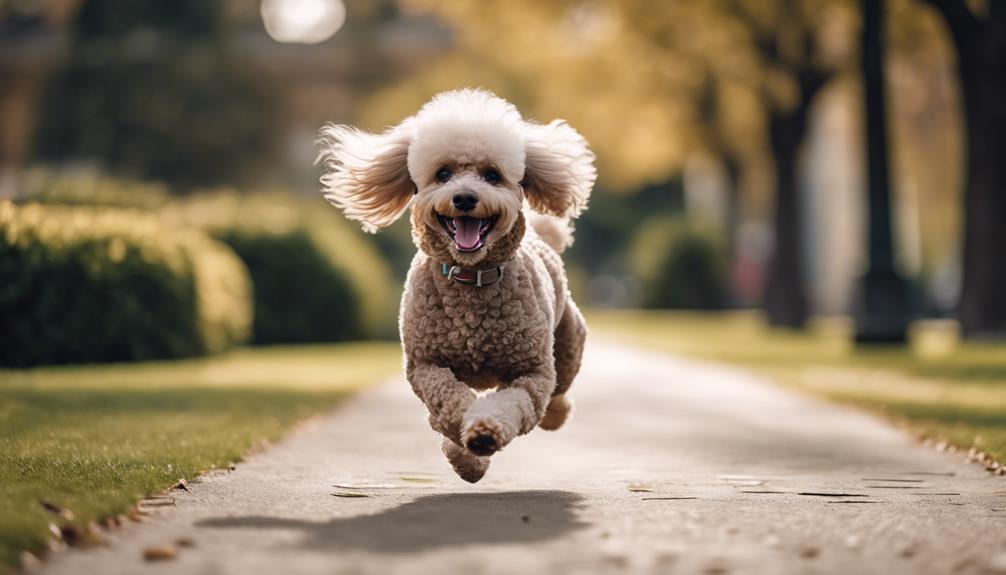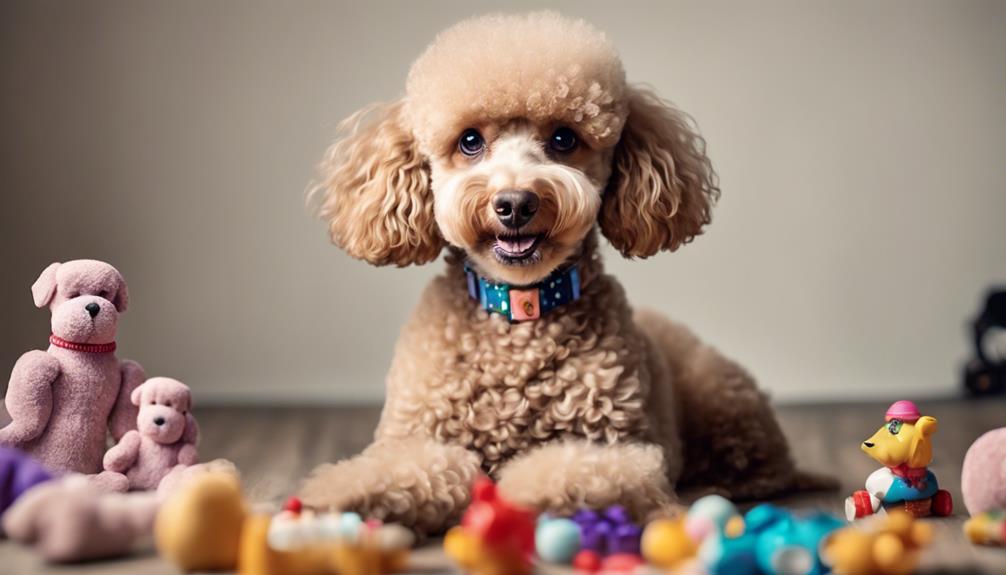When it comes to understanding Poodle temperament, exploring the nuances of each size – Standard, Miniature, and Toy – can offer valuable insights into their distinct personalities. From their high intelligence to their energetic nature, Poodles have a lot to offer as companions. However, there is more to uncover beyond their fluffy exterior. Discovering how to navigate their unique temperaments can lead to a fulfilling and harmonious relationship.
Key Takeaways
- Poodles have distinct temperaments based on size, ranging from confident to sensitive.
- Understanding poodle traits aids in selecting the right fit for your lifestyle.
- Positive reinforcement training is crucial for managing their high energy and intelligence.
- Socialization and grooming are essential for nurturing a strong bond with your poodle.
The History and Origin of Poodles

Originating in Germany and France, Poodles were selectively bred for their exceptional swimming abilities and intelligence, primarily serving as skilled water retrievers. The history of Poodles dates back to the 15th century when they were bred to assist hunters in retrieving waterfowl. Their unique curly coat, which is both hypoallergenic and water-resistant, was a key feature in aiding them in their original role. Over time, Poodles gained popularity beyond their hunting duties and became favored companion dogs, especially among the French aristocracy, symbolizing luxury and sophistication.
The origin of Poodles as water retrievers significantly influenced their temperament. Their intelligence and trainability, honed through years of selective breeding, make them highly adaptable to various environments. This history of being working dogs has instilled in Poodles a sense of purpose and loyalty, traits that continue to define their temperament today. Understanding the historical context of Poodles sheds light on their characteristics as loving, intelligent companions with a strong work ethic.
Understanding Different Temperaments

The history of Poodles as skilled water retrievers has significantly shaped the diverse temperaments found across Standard, Miniature, and Toy varieties. Standard Poodles are known for being confident, outgoing, and friendly, making them excellent companions and family pets. On the other hand, Miniature Poodles tend to be more reserved and adaptable, making them suitable for apartment living. Toy Poodles, despite their small size, are lively, sensitive, and develop strong bonds with their owners, showcasing a vibrant personality. While each Poodle size may exhibit variations in temperament, understanding these general traits helps in comprehending their typical characteristics. By recognizing the specific traits and tendencies of Standard, Miniature, and Toy Poodles, individuals can better choose a suitable match based on their lifestyle and preferences. These variations in temperament across Poodle sizes offer a range of options for different households and living situations.
Common Traits of Poodle Temperament

Poodles exhibit distinct behavior patterns, showcasing high energy levels and a need for regular exercise to maintain their well-being. Their social interaction tendencies lean towards forming strong bonds with their human family members, seeking companionship and engagement. In training, poodles are highly responsive to positive reinforcement methods, requiring consistent and structured approaches for successful outcomes.
Poodle Behavior Patterns
With their high energy levels and keen sense of alertness, poodle behavior patterns reflect a combination of vitality and attentiveness that define their temperament. Poodles are not only trainable but also affectionate companions, making them a popular choice for those seeking an interactive and loving pet. Here are some common traits of poodle behavior patterns:
- High Energy Levels: Poodles are known for their lively and energetic nature, requiring regular physical activity to keep them happy and healthy.
- Trainable: Due to their intelligence and eagerness to please, poodles respond well to positive reinforcement training methods.
- Affectionate: Poodles form strong emotional bonds with their human family members, thriving on love and attention.
Social Interaction Tendencies
Poodle temperament manifests in distinct social interaction tendencies that highlight their unique blend of energy and attentiveness. These dogs are known for their loyalty and affection towards their human companions, forming strong emotional bonds. Poodles thrive on social interaction and enjoy being part of the family activities. Their playful nature and love for attention make them excellent companions for individuals or families seeking a devoted pet. Due to their high level of intelligence, they are receptive to training and respond well to positive reinforcement methods. Poodles' social interaction tendencies are characterized by their eagerness to please and their ability to adapt to different social situations, making them versatile and engaging pets.
Temperament in Training
Regularly engaging in training activities is essential to harness the common traits of the Poodle temperament, ensuring mental stimulation and behavioral fulfillment. When conducting training sessions with your Poodle, consider the following:
- Positive Reinforcement Techniques: Poodles respond well to praise, treats, and consistency, making positive reinforcement a highly effective method for training.
- Firm and Positive Leadership: Despite occasional stubbornness, providing firm yet positive leadership helps guide your Poodle's behavior in a constructive manner.
- Consistent Training Sessions: Regular and structured training sessions are key to maintaining your Poodle's alertness and mental agility while strengthening the bond between you and your furry companion. By incorporating these elements into your training routine, you can help your Poodle reach their full potential.
Level Of Energy

Maintaining a poodle's high level of energy requires consistent exercise and mental stimulation to ensure their well-being and temperament stability. Poodles have a significant amount of energy that needs to be channeled positively through regular exercise routines and engaging activities. By meeting their exercise needs, you can help prevent boredom-related behaviors and keep them physically and mentally healthy. A balance of physical exercise and mental stimulation is key to managing their energy levels effectively.
To emphasize the importance of understanding and meeting their exercise requirements, consider the following table:
| Energy Levels | Exercise Needs |
|---|---|
| High | Regular physical activity is essential to prevent boredom and maintain well-being. |
| Medium | Engaging in interactive play sessions and walks can help meet their energy requirements. |
| Low | Even though energy levels may be lower, some form of daily exercise is still beneficial for overall health. |
| Very High | Intense physical activities like running, agility training, or swimming are ideal to burn off excess energy. |
Alertness

With their innate sharpness and quick awareness, the alertness of Poodles sets them apart as exceptional companions and watchdogs. Poodles exhibit a keen sense of awareness that allows them to quickly pick up on changes in their environment. This heightened alertness contributes to their ability to learn and respond to commands effectively, making them highly trainable and adaptable to various situations and environments. Their alert nature enhances their capability to form strong bonds with their human family members, as they are attuned to the needs and emotions of those around them. Poodles' alertness not only makes them excellent watchdogs but also loyal and loving companions who are always ready to provide comfort and support. In essence, their sharp awareness adds a layer of security and attentiveness to the unique temperament of Poodles, making them cherished members of the family.
Positive Reinforcement Methods

When training your Poodle, utilizing reward-based techniques can be highly effective in encouraging desirable behaviors. By offering treats, praise, or play as positive reinforcement, you can motivate your Poodle to repeat good actions. Studies support that this method not only enhances training results but also fosters a positive relationship between you and your Poodle.
Reward-Based Training Techniques
What makes positive reinforcement training techniques effective for shaping your poodle's behavior and strengthening your bond with them? Positive reinforcement training involves rewarding desired behaviors with treats, praise, or toys to encourage repetition. Here are the benefits:
- By focusing on reinforcing good behavior, you can encourage your poodle to repeat those actions.
- Studies show that positive reinforcement methods lead to better learning retention and emotional well-being for dogs.
- Consistency and patience are vital when implementing reward-based training techniques with your poodle. By being consistent in your approach, you can effectively communicate what behaviors are desirable, helping your poodle learn and thrive.
Encouraging Desirable Behaviors
To enhance your poodle's behavior and strengthen your bond, implementing positive reinforcement methods is key. Positive reinforcement involves rewarding desirable behaviors, such as following commands or displaying good manners, with treats, praise, or toys. By focusing on rewarding good behavior rather than punishing unwanted actions, you create a positive learning environment for your poodle. Studies have shown that positive reinforcement not only leads to better learning retention but also fosters stronger bonds between dogs and their owners. Consistently using positive reinforcement helps shape your poodle's behavior effectively. Through rewards and positive feedback, your poodle will be motivated to engage in behaviors that are desired by you, leading to a well-behaved and happy companion.
Training for Balanced Temperament

Early training through positive reinforcement is crucial in shaping a balanced temperament in Poodles. To achieve this, consider the following:
- Basic Commands: Teaching your Poodle basic commands using positive reinforcement lays the foundation for good behavior and obedience.
- Socialization: Expose your Poodle to various environments, people, and animals to help them develop confidence and adaptability.
- Structured Training: Enrolling in puppy kindergarten or obedience classes can provide the structured training needed to reinforce desired behaviors and responses.
Socialization Techniques

To foster well-rounded behavior in your Poodle, mastering effective socialization techniques is essential. Socialization techniques involve exposing your Poodle to various environments, sounds, people, and animals during their critical developmental stages. Positive interactions play a crucial role in helping your Poodle build confidence, reduce fear, and develop good behavior around different stimuli.
It is important to remember that socialization should be a gradual process. Start with controlled environments and slowly progress to more challenging situations. This gradual approach helps build resilience in your Poodle, ensuring they are well-adjusted and friendly companions in different social settings. Early and ongoing socialization is key to preventing fear-based aggression, anxiety, and behavioral issues in your Poodle's later life.
Consistent socialization efforts will pay off, as they help your Poodle grow into a well-adjusted, adaptable, and friendly companion. By exposing your Poodle to positive experiences in a variety of settings, you can help shape their behavior and temperament for the better.
Choosing the Right Poodle

When selecting a Poodle that best fits your lifestyle, carefully consider factors such as size, energy level, grooming needs, and temperament compatibility.
- Size and Energy Level: Match the size and energy level of the Poodle to your living situation and activity level. Toy Poodles are suitable for small spaces and apartments due to their compact size and lower exercise requirements.
- Grooming Needs: Poodles with hair require regular brushing, trimming, and professional grooming to keep their coat healthy and free of mats.
- Temperament Compatibility: Ensure the temperament and energy level of the Poodle align with your daily routine for a harmonious relationship. Consider consulting with reputable breeders or rescue organizations to find the right Poodle that matches your preferences and lifestyle.
Frequently Asked Questions
What Are the Behavior Issues With Poodles?
To address behavior issues with Poodles, consider training techniques, socialization strategies, and behavioral modification. By providing consistent training, positive social experiences, and addressing any underlying issues, you can help your Poodle thrive and exhibit positive behaviors. It’s important to identify and understand common behavioral problems in Poodles, such as excessive barking, separation anxiety, or nervousness around new situations. By remaining patient and using reward-based training methods, you can gradually curb these tendencies and encourage desirable behavior. Regular exercise and mental stimulation also play vital roles in keeping your Poodle happy and well-adjusted. Early intervention is key when dealing with undesirable behaviors, as it sets the foundation for a well-adjusted dog. For instance, if you’re struggling with nipping or chewing, employing effective poodle puppy biting tips, such as redirecting their attention to appropriate toys, can make a significant difference. Patience, clear communication, and rewarding good behavior will go a long way in fostering a happy and well-behaved Poodle.
Which Poodle Mix Has the Best Temperament?
When it comes to poodle mixes, the Labradoodle tends to shine with a temperament that combines intelligence, trainability, and a gentle demeanor. Their blend of Poodle and Golden Retriever traits makes them excellent companions for families seeking a friendly and adaptable pet.
What Is the Temperament of a Standard Poodle?
Poodle obedience training is crucial for their development. The socialization process helps them interact well with others. High energy levels mean regular exercise is a must. Standard Poodles are intelligent, friendly, and great for families.
What Level of Aggression Do Poodles Have?
When it comes to aggression levels, Poodles are more likely to show fear or anxiety than aggression. Proper training and socialization are key in handling any triggers. Prevention through positive reinforcement can help maintain their non-aggressive nature.
Conclusion
In conclusion, understanding Poodle temperament is key to building a strong bond with these intelligent and loyal companions. Remember, as the saying goes, "You can't teach an old dog new tricks." By starting early with training and socialization, you can help your Poodle develop a balanced temperament that will make them a joy to have around for years to come. Choose the right Poodle for your lifestyle and commit to their care to ensure a happy and harmonious relationship.
